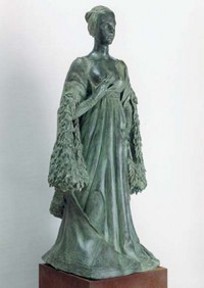
We've been back three weeks from our travels and the furthest we have been is Gandía, the largest of our neighbouring towns and the fifth largest city in the Valencia region with a population of 80,000.
We haven't had much cause to go there before but as part of our busy schedule of fitness activities we cycled up the bike track from Oliva and had a snoop around.
On entering the old town we came upon a group of statues. If the statues chosen as local heroes are an indication of what it is like then Gandía should be pretty interesting. Rather than some dull king or general, we came face to face with a statue of Lucrezia Borgia, from the infamous family mostly associated with late 15th century Renaissance Italy.
Next to her statue is one of her father, Rodrigo, better known as Pope Alexander VI, and other members of Gandía's most famous family (they became Dukes of Gandía from 1480). They were more upwardly mobile than Kate Middleton and more ruthless than Attila the Hun. It seems that being Pope didn't get in the way of Rodrigo and his family's preference for parties and orgies that exceed the wildest dreams even of Silvio Berlusconi (well, maybe).
One of the Borgias' main weapons was Lucrezia herself who was married off three times to prominent Italians whose lives came to premature, sticky ends when they ran out of usefulness. As wikipedia summarises, Lucrezia's family later came to epitomize the ruthless Machiavellian politics and sexual corruption alleged to be characteristic of the Renaissance Papacy and she has been cast as the classic femme fatale in various operas, books, plays and films.
Five hundred years on and just around the corner in the Plaza Mayor it was pantomime villain time again. As reported a couple of weeks ago, the youth of Spain is revolting by camping out in the main squares of cities up and down the country. The protests started over the perceived lack of democracy and political corruption and saturday was the day for investing all the new mayors.
The Gandía version of the protest was still going strong and a decent sized group had gathered to heckle the new mayor on arrival and generally have a good old whinge about life in general. Surveys say that over 80% of the population support these Indignados (the outraged or indignant ones) which is a higher percentage than either of the main parties will ever get and their frustration is understandable. When unemployment reaches these kind of levels we think the capitalist system can be deemed to have failed and there is little sign of any political or economic solution to the country's problems. Five hundred years ago we would have married Lucrezia to the head of the International Monetary Fund and/or the head of the European Central Bank to avoid any more austerity measures and life could have gone on as usual.
No comments:
Post a Comment